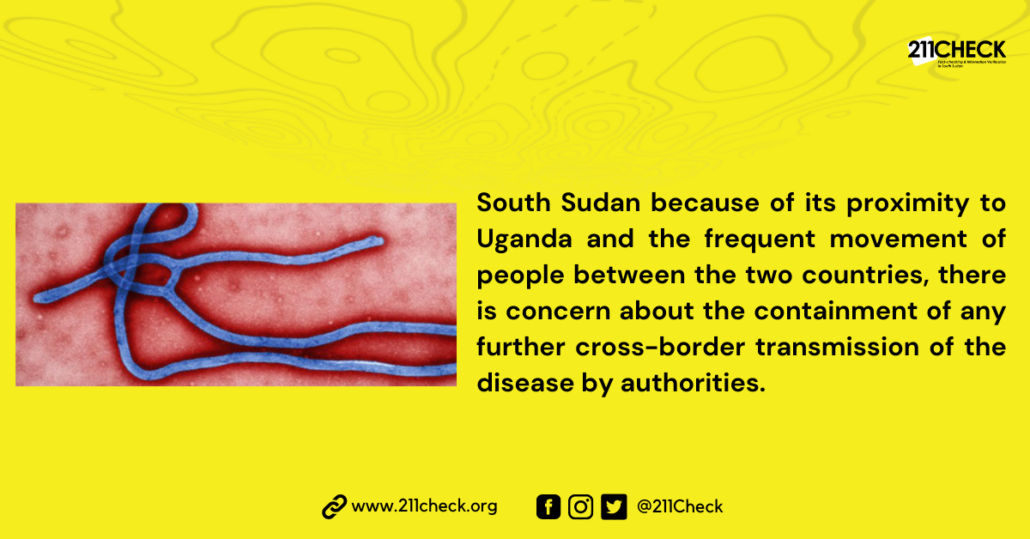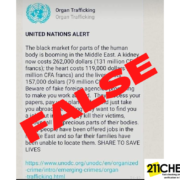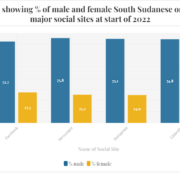Explainer: Ebola outbreak in Uganda, what it means for South Sudan, and how to stay safe.
Writer: Makur Majeng
Uganda’s Ministry of Health, in its report on 30 January 2025, confirmed a new outbreak of Ebola in the capital, Kampala, with one fatality recorded. The patient in question was a 32-year-old male nurse who displayed great internal bleeding and multiple organ failure, which included high fever, chest pain, and most importantly, difficulty in breathing before he succumbed to death at Mulago Hospital.
Ugandan health investigators have established close contact tracing of 44 people, including 30 healthcare workers among them. The outbreak of the Sudan Ebola virus is concerning because there is no approved vaccine for the variant.
This is not the first time Uganda has experienced an Ebola outbreak, but it has been on and off since the early 2000s and recently.
Sudan Ebola Virus image; Source: Africa CDC
Because of its proximity to Uganda and the frequent movement of people between the two countries, there is concern about the containment of any further cross-border transmission of the disease by the authorities in South Sudan.
This article further looks at what Ebola is, how it originated, how it is prevented, and the actions the Ministry of Health in South Sudan has taken to counter the virus before reaching the country.
What is the Ebola virus?
It is an acute infectious, deadly illness that affects humans and non-human primates that is caused by one of the members of the family of Filoviridae, ebolavirus. The Ebola class, as a hemorrhagic fever, means great internal bleeding, lots of exterior skin bleeding, organ failure, and in many cases triggers death.
There are six strains of the Ebola virus acknowledged, four other forms of which can cause an infection in monkeys:
- Zaire ebolavirus (the deadliest and most common due to vaccines),
- Sudan ebolavirus ( SUDV) (the one which caused the outbreak in Uganda: There is no vaccine currently approved. ),
- Bundibugyo ebolavirus,
- Taï Forest ebolavirus.
- Reston ebolavirus (affects non-humans but does not participate in the epidemic among human beings).
- Bombali ebolavirus (is found in bats; there are yet no officially known cases of people infected).
Ebola is commonly spread through direct contact with any of the bodily fluids of an infected person: blood, saliva, urine, vomit, sweat, faeces, breast milk, or semen. Contaminated surfaces and any piece of contaminated medical equipment also allow transmission; hence, the tendency to be a high-risk area.
How Did Ebola Come About?
In 1976, the first recorded outbreak of Ebola occurred in the Democratic Republic of Congo (DRC) near the Ebola River, from where it gets its name. The virus is thought to have originated from fruit bats, which serve as natural hosts. Ebola is a zoonotic disease, meaning it is transmitted from animals to humans, typically through contact with already infected animals such as chimpanzees, monkeys, gorillas, or becoming infected through bushmeat.
The Ebola outbreak occurred mainly in Central and West Africa, which has seen serious outbreaks in the DRC, Uganda, Guinea, Sierra Leone, and Liberia.
What are the Ebola symptoms?
As stated by the WHO, Ebola symptoms occur between 2 and 21 days after infection and worsen rapidly. Among the key symptoms are:
- Early Symptoms (Flu-like):
- High fever (higher than 38.5°C)
- Severe headache
- Muscle pain and general weakness
- Sore throat
- Advanced Symptoms:
- Vomiting and diarrhoea
- Rash and red eyes
- Uncontrolled bleeding from the body (internal and external)
- Failure of organ systems and multi-organ collapse
Are There Any Preventive Measures?
According to the UK Health Security Agency, there is no licensed vaccine for the Sudan ebolavirus, but preventive measures may include:
- Avoid direct contact with infected individuals or animals.
- Practice proper hand hygiene; wash hands with soap and water or disinfect them using a hand sanitiser.
- Wear a protective suit and masks when treating patients in high-risk areas.
- Avoid bushmeat, which carries the potential to transmit the virus.
- Thoroughly disinfect areas contaminated with bodily fluids of an infected person.
What is South Sudan’s Ministry of Health Response?
After the Ugandan government’s confirmation of a Sudan ebolavirus outbreak in Kampala, Uganda’s government notified the South Sudan Ministry of Health about the outbreak. In response, the health ministry announced surveillance measures at major points of entry, with enhanced screening procedures for incoming travellers at Juba International Airport and the Nimule border and more intensified monitoring of individuals entering from Uganda.
With the rampant border movement between South Sudan and Uganda, the country is at a greater risk of virus transmission, according to Dr. Kediende Chong, Director General for Preventive Health Services and Emergency Response, as quoted by Eye Radio.
Dr. Chong emphasised that these measures were necessary due to the movement of people between the two countries, which heightens the risk of the Ebola virus entering South Sudan.
Among the measures, citizens are urged to be vigilant and to report any suspected cases of Ebola to the nearest health facility, and early detection and isolation can prevent the spread of the virus.
Conclusion:
Ebola’s outbreak in Uganda poses serious public health challenges for bordering countries like South Sudan, although Ebola has not yet been reported in South Sudan. However, prevention is key to stopping the spread of the deadly virus and the Ministry of Health has announced enhancing border surveillance, public awareness, and health facility preparedness to protect the citizens.
To ensure accuracy and transparency, we at 211 Check welcome corrections from our readers. If you spot an error in this article, please request a correction using this form. Our team will review your request and make the necessary corrections immediately, if any.
It’s vital to fight misinformation and disinformation in the media by avoiding fake news. Don’t share content you’re uncertain about. False information can harm and mislead people, risking their lives—Fact-check before sharing. For more details, visit https://211check.org/, or message us on WhatsApp at +211 921 350 435. #FactsMatter.

 211 Check Website Graphics
211 Check Website Graphics






Leave a Reply
Want to join the discussion?Feel free to contribute!